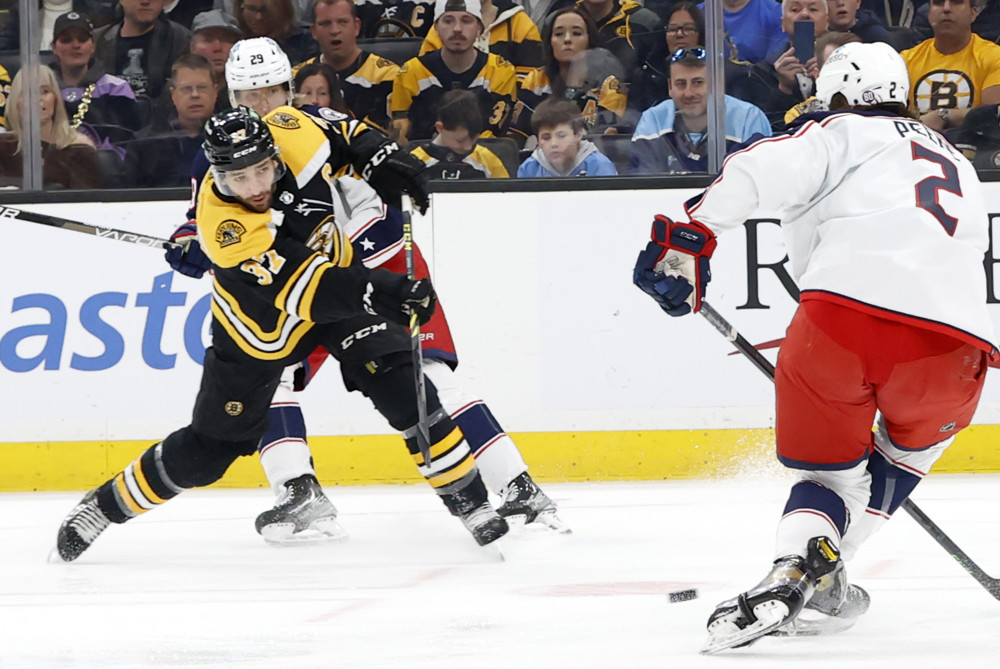How Patrice Bergeron Is Leaving His Selke Competition in the Dust
When Zdeno Chara left the Boston Bruins in free agency two years ago, it felt like the end of an era. Not only did the team lose its captain, but it also lost its primary source of snarl. The roster upheaval didn’t stop there either. Torey Krug took his talents to St. Louis. David Krejci went home to play for HC Olomouc of the Czech Extraliga. Tuukka Rask announced his retirement in February due to hip issues. The vaunted Perfection Line, once universally viewed as the best trio in hockey, was split up to spread out the attack.
These Bruins barely resemble the version that reached the 2018-19 Stanley Cup Final.
And yet they’re firmly in a playoff position and one of the stingiest teams in the NHL. No contender really wants to face them in the first round. That’s largely due to every star forward’s worst nightmare, Patrice Bergeron (55 points in 64 games). Boston’s heartbeat remains a 200-foot stalwart in his 18th professional campaign. In fact, he’s lapping this season’s Selke Trophy field.
Let’s get the obvious part out of the way early: He’s a phenomenal defensive forward. Despite average skating, an average frame (6’1”, 195 lbs) and a ton of games under his belt, Bergeron can still put the clamps on the best talent around:
His vast experience informs his positioning, as he’s learned how to continually take the right depth and angle to deny attackers the space they seek. Much like a shutdown cornerback can undercut a wide receiver’s route because they know precisely what’s coming, Bergeron often gets to his spot ahead of his mark. His hockey sense hasn’t deteriorated whatsoever. As a result, he’s always either in the opposition’s hip pocket or peeling off to fortify Boston’s wall at the point of attack. He’s right where he needs to be.
Bergeron’s stick work is just as suffocating. He guides players where he wants them and then pounces the moment the puck is exposed. That sense of opportunism is most evident when he’s stalking his prey on the backcheck. His routes to the house are so efficient that he’s there to spring his trap before opponents even realize they don’t have as much time as they believed.
We can’t discuss his defense without addressing his faceoff proficiency either. He’s first overall (62.4%) and second behind Claude Giroux in defensive faceoff percentage (60.0%). This allows the Bruins to survive hairy situations because they can ice or freeze the puck if they aren’t comfortable with the pressure the opposition is applying. More often than not, Bergeron will claim the draw, win possession and Boston can exhale.
While his defense is undoubtedly great, his effectiveness spans far beyond his end. The true key to his dominance is his three-zone puck support:
No one governs the ice as comprehensively as Bergeron does because he focuses on those fleeting windows when the puck doesn’t belong to either team. With possession up for grabs, his positioning steers him to victory. It’s…spotless. Multiple players across different outfits will be fighting for the puck, and he’ll casually float by to tip the scale in Boston’s favor.
This translates to clean breakouts, seamless transition and the ability to chain together waves of attack. He makes life easy for the Bruins. More specifically, you won’t find a better F3 in the NHL. He’s far more disciplined than fellow star centers, but he’s far more talented than defensive specialists. Consequently, he does a brilliant job of staying on the right side of the puck to guarantee his club’s control and then navigating lower when he sniffs a chance. Those come frequently when you line up beside Brad Marchand (72 points in 61 games).
And when his IQ alone isn’t enough, he displays the hustle required to come out on top in 50/50 battles. His knack for sealing off the wall and forcing the play back to his teammates is particularly impressive:
Thanks to his smothering defense and unwavering puck support, Boston’s captain is its security blanket. He can put out his teammates’ fires, but he usually prevents smoke from developing in the first place. Among the 228 forwards who have played at least 750 minutes at 5-on-5 this season, Bergeron is conceding the fewest high-danger chances and expected goals. His competition is nowhere close.
Overall, Boston posts an absurd 69.4 xGF% (1st) and 65.6 GF% (7th) during his shifts. Better yet, 38.6% of his ice time is spent facing elite opponents, and the Bruins own 63.1% of the dangerous attempts and 69.2% of the actual goals under those circumstances.
Now, you could make the argument that Bergeron benefits from playing alongside a brilliant playmaker in Marchand. His production doesn’t lie. However, it’s clear that Marchand gets even more out of this partnership. Without his longtime center, his xGF% and GF% plummet from 69.5 and 65.4 to 46.9 and 45.4, respectively. On the flip side, Bergeron fares just as well without Marchand. The pesky winger needs a conscientious two-way presence to feed him touches and let him play at his freewheeling best.
Whether you agree with it or not, Selke voting places considerable weight on offense. This is when the Marchand-Bergeron connection takes flight. The former is the top unit’s creator, buzzing around the puck, spinning away from defenders and scanning the ice for openings. Meanwhile, the latter knows his role and emphasizes quick touches:
He’s an excellent bumper on the power play, he prowls around the slot for one-timers and he’s got a keen nose for deflections. The puck never lingers on his stick. It’s not surprising, then, that he rarely gives it away.
When you add up his strengths, you get a three-zone titan. His precision and consistency are almost robotic. Frankly, there’s a case to be made that he should have won the Selke Trophy every year since 2013. Forget voter fatigue, narratives or the notion that another candidate is “due” for the distinction. Give the award to the most deserving player. Period. That’s Bergeron once again. By delivering one of the finest years of his career, he’s reminding the hockey world that he sets the Selke pace.
The more things change in Boston, the more they stay the same.
Recent Posts

How Corey Perry Is Making His Presence Felt With the Lightning
View Post »
How Adam Fox Pushed the Rangers Past the Penguins
View Post »

 PHI
PHI PIT
PIT TOR
TOR MTL
MTL TBL
TBL CHI
CHI EDM
EDM VAN
VAN COL
COL STL
STL BUF
BUF WSH
WSH NJD
NJD BOS
BOS NYR
NYR NYI
NYI DET
DET CAR
CAR NSH
NSH CBJ
CBJ WPJ
WPJ CGY
CGY ARI
ARI SJS
SJS VGK
VGK ANA
ANA LAK
LAK MIN
MIN OTT
OTT FLO
FLO DAL
DAL